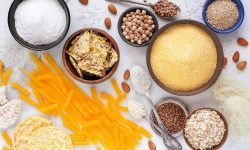Favourite Gluten-Free Items Available at Spud May National Celiac Awareness Month, but every day Spud…
Happy New Year!
Like many, the return to the “normal” routine after the holidays is far from happy — and frankly rather stressful. From guilt around what was over-eaten and workouts missed over the holidays, to the emails piling up in one’s inbox, it can be a bit of a reality shock come January.
But I’m here for you! As a Registered Psychologist specializing in Health Psychology, my practice come January is always fully booked with individuals or families looking to dive deep into the topics of stress and healthy lifestyle routine or goal setting.
Using tools from Nutritional Psychology, Positive Psychology, and Mindfulness-Based interventions, I assist clients and community members like YOU as well as my own growing family in reducing the impact of stress in their lives, and curating a wellness path that best suits your lifestyle.
WHY MIND STRESS?
Some stress is good, such as deadlines encouraging us to get a project completed, and that adrenaline rush right before a big meeting, interview, or speech. However, chronic stress can be damaging long term to almost all body systems. With a passion for mental and physical health, I pay particular attention to how stress impacts the brain and gastrointestinal system (GI system, or the gut). In my own life and those of my clients, I teach about how mindfulness-based and nutritional-psychology-based interventions can benefit the brain and gut and potentially decrease the impact of stress.
The brain and the GI system are intimately connected. A troubled intestine can send signals to the brain, just as a troubled brain can send signals to the gut. Thus, your stomach or intestinal distress can be the cause or the result of stress. Further, chronic stress can cause a decrease in blood flow and oxygen to the stomach, which can lead to inflammation or an imbalance in gut bacteria.
FOODS + SUPPLEMENTS
Blush Lane Organic Markets and Spud.ca grocery delivery services offer a number of foods and supplements that may reduce cortisol levels and inflammation that’s often a result of high stress levels.
It’s helpful to have real foods, like nuts, in as sometimes people don’t go to that first line of defense — food— and instead first go to pills or tinctures (which certainly have their place)!
MAGNESIUM RICH FOODS
- Magnesium is a mineral that helps manage cortisol levels and can modify the effect of chronic stress (Cuciureanu and Vink, 2011).
- Raw, organic almonds are a tasty whole foods option for getting more magnesium into your diet. You can consume a handful as a snack, or soak a few to pop into your favourite smoothie or elixir.
- Seaweed is another source of magnesium. Our family loves seaweed snacks, especially these ones.
TEA & ELIXIRS
- Golden Mylk features 2 powerhouse ingredients: turmeric and ashwagandha. Turmeric is a golden yellow spice has been all the health-food rage for many years as it’s known to be a potent anti-inflammatory (Chainani-Wu, 2003). Ashwagandha is an adaptogenic herb to support energy levels, immune function, and reduce anxiety and stress (Alramadhan et al., 2012).
- There are many herbal teas, such as peppermint tea that don’t have extensive clinical research backing their use, but are part of a relaxing wind-down routine for many. The simple act of wrapping one’s hands around a hot cup of tea can be very relaxing.
PROBIOTICS
- Probiotics have the potential to diminish the body’s response to chronic stressors, and there are a number of ways to get probiotics into the diet (Clapp et al., 2017).
- Fermented foods such as cultured coconut yogurt or kraut are great whole foods options.
- If you are a regular gum chewer, there’s a probiotic for that.
- You can also consider taking capsules with your daily vitamins.
- Gut shots packed with probiotics, are also a popular means of getting healthy bacteria into the GI system. Some take these as shots to accompany their vitamins. Others add to juice or salad dressings.
OTHER SUPPLEMENTS
- Ashwagandha, found in liquid drops, capsules or powder, is an adaptogenic herb to support energy levels, immune function, and reduce anxiety and stress (Alramadhan et al., 2012).
- Holy basil has been part of many clinical studies, and found to support a healthy response to stress (Jamshidi and Cohen, 2017).
These foods and supplements may fit within your daily ritual or when you’re noticing your stress level kicking into high gear.
MIND+BODY PRACTICES
Here are some mindfulness-based practices that anyone (including you!) can implement into a daily or weekly routine. I offer suggestions for how my family and my clients have anchored these practices with foods and supplement intake.
BREATHE WORK:
- Breathing exercises have been shown in numerous research studies to reduce one’s stress response (Ma et al., 2017).
- One popular breathing practice is the 3 Minute Breathing Space. It starts with closing your eyes and focusing on the physical sensations of your deep breath, and gradually expand that awareness through your whole body, and to your environment, for as little as 3 minutes.
- Another is the 4-7-8 Breathe, whereby you inhale to a count of 4 through your nose; hold your breath to a count of 7, then exhale slowly through the mouth to a count of 8. Repeat for as many cycles until you feel more relaxed.
- After you complete your breathing exercise, open your eyes and enjoy the nourishment before you, whether it’s your vitamins or supplements, a meal, snack, smoothie, or warming beverage.
MEDITATION:
- We know from research that meditation helps regulate the stress response, thereby suppressing chronic inflammation states and maintaining a healthy gut function (Househam et al., 2017). Even as little as ONE meditation session has been shown to reduce stress and anxiety (Science Daily, 2018)!
- The Loving Kindness Meditation is a particular meditation that is associated with decrease in anger and distress (Hofmann et al, 2011). This meditation involves wishing well to our selves and to others.
- The Body Scan is a foundational mindfulness practice, with serious scientific backing (Zanesco et al., 2013). It simply involves allowing your awareness to float systematically from your feet towards the top of your head. The body scan can be practiced seated in a chair or on the floor, or lying down. It can increase awareness to your physical needs and sensations, which can in turn help you take better care of your body and make healthier decisions about eating, sleep, exercise, and more.
- Try anchoring one of the meditations here with a delicious warming beverages from tea to golden mylk in the morning, afternoon, or your nightly routine. The Calm or Insight Timer apps offer great guided meditations, including those below.
HERE’S TO A MINDFUL AND NUTRITIOUS NEW YEAR
So try this recipe of nutritious and mindful practices for lasting health upgrades for mind and body for the year ahead. Happy new year, and may you experience joy, love, happiness, relaxation, health, and good intentions!
Pssssssssst…. Stay tuned for my forthcoming book “Mindful Mamas and Papas: A Mindful Living Guide for the Whole Family” which has loads of mindfulness tips and recipes you can integrate brain and body nourishing ingredients into, like those Blush Lane and Spud has curated just for YOU!
 Written by Sally Powis-Campbell
Written by Sally Powis-Campbell
Sally Powis-Campbell is a Registered Psychologist with a private practice in Calgary, Alberta. Sally primarily practices in the field of Health Psychology, with specialized training in nutrition psychology, integrative nutrition, mindful eating, and mindfulness for performance in business and sports. She travels across Western Canada curating interactive food, fitness, and mindfulness events.
If you’re interested in learning more about stress-reduction tools based in mindfulness and health psychology, I encourage you to reach out to me. I offer online therapy as well as in-person therapy individual (children, teens and adults), couples, families, and small groups (friends or work teams). Also stay tuned for my book, Mindful Mamas and Papas: Mindful Living for the Whole Family, which is hitting shelves and Amazon early 2019!
Email: sally@wholistichealthyyc.com
Website: www.wholistichealthyyc.com/contact
Photos by @radmencreative
DISCLAIMER
The advice in this article is meant for informational purposes only and is not meant to prescriptive or to replace medical advice. Please consult a physician if you are considering adding supplements to your diet to review any pre-existing conditions that may contraindicate use or to review possible drug interactions with herbs included in any of the products featured in this article.
REFERENCES
Alramadhan, E., Hanna, M. S., Hanna, M. S., Goldstein, T. A., Avila, S. M., Weeks, B. S. (2012). Dietary and Botanical Anxiolytics. Med Sci Monit. 18(4): RA40–RA48. doi: 10.12659/MSM.882608
Buhlmayer, L., Birrer, D., Rothlin, P., Faude, O., Donath, L. (2017). Effects of Mindfulness Practice on Performance-Relevant Parameters and Performance Outcomes in Sports: A Meta-Analytical Review. Sports Med. 47(11): 2309-2321. doi: 10.1007/s40279-017-0752-9.
Chainani-Wu, N. (2003). Safety and Ati-Inflammatory Activity of Curcumin: A Component of Turmeric (Curcuma Longa). Journal of Alternative and Complementary Medicine 9(1), pp. 161-168. Retrieved from https://www.ncbi.nlm.nih.gov/pubmed/12676044
Clapp, M., Aurora, N., Herrera, L., Bhatia, M., Wiley, E., Wakefield, S. (2017). Gut microbiota’s effect on mental health: The gut-brain axis. Clin Pract. 7(4): 987. doi: 10.4081/cp.2017.987
Cuciureanu, M.D., Vink, R. (2011). Magnesium and Stress. Magnesium in the Central Nervous System. Adelaide (AU): University of Adelaide Press; 2011. Retrieved from: https://www.ncbi.nlm.nih.gov/books/NBK507250/?report=printable
Hofman, S.G., Grossman, P., Hinton, D.E. (2011). Loving-Kindness and Compassion Meditation: Potential for Psychological Interventions. Clin Psychol Rev. 31(7): 1126–1132. doi: 10.1016/j.cpr.2011.07.003
Househam, A.M., Peterson, C.T., Mills, P.J., Chopra, D. (2017) The Effects of Stress and Meditation on the Immune System, Human Microbiota, and Epigenetics. Adv Mind Body Med. 31(4):10-25.
Jamshidi, N., and Cohen, M.M. (2017). The Clinical Efficacy and Safety of Tulsi in Humans: A Systematic Review of the Literature. Evid Based Complement Alternat Med. 2017; 2017: 9217567. doi: 10.1155/2017/9217567
Science Daily (2018). Even a single mindfulness meditation session can reduce anxiety: People with anxiety show reduced stress on the arteries after 1-hour introductory session. Based on a research study in Experimental Biology 2018. Retrieved from www.sciencedaily.com/releases/2018/04/180423135048.htm
Thorpe, M. (2017). 12 Science-Based Benefits of MeditationHealth Line. Health Line. Retrieved from https://www.healthline.com/nutrition/12-benefits-of-meditation#section5
Zanesco, A.P., King, B.G., Maclean, K.A., Sharon, C.D. (2013). Executive control and felt concentrative engagement following intensive meditation training. Front Hum Neurosci. 2013 Sep 18;7:566. doi: 10.3389/fnhum.2013.00566.




